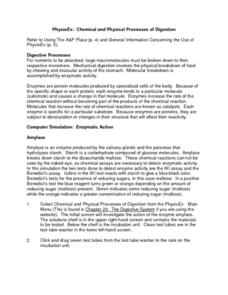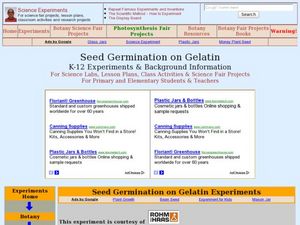Curated OER
Growing Plants with Worm Castings
Students test worm castings for content and use them to grow seeds. They hypothesize which castings best sustain seed growth. They observe growing plants to test their hypotheses. Later they graph their data.
Curated OER
Can Fun Gus Help Plants/Trees Grow?
Learners participate in an experiment in which they test the growth of different types of plants. They discover how growth rates vary using inoculum. They draw pictures and are read books about plants to end the lesson.
Curated OER
Germinating Seeds on Gelatin
Students germinate seeds in unflavored gelatin to which liquid house plant food has been added. Students observe and record plant growth in this medium with a variety of variables in a number of experiments.
Curated OER
Water Quality Monitoring
Students comprehend the four parameters of water quality. They perform tests for salinity, dissolved oxygen, pH and clarity or turbidity. Students comprehend why scientists and environmental managers monitor water uality and aquatic...
Virginia Department of Education
Changes in Ecosystems
How does water pollution affect the environment? Provide your class with the resources to answer this question as they learn about eutrophication and ecosystem changes. Over two weeks, they simulate the effects of pollution on the...
Virginia Department of Education
A-Mazing Plants
Have your young scientists questioned why plants grow a particular way? Through this learning opportunity, scientists gain firsthand knowledge about how plants develop and various factors that affect rates of growth as they bring plants...
Curated OER
Writing Process- Expository Writing
Expository writing is the focus of the language arts lesson presented here. In it, young writers review what expository writing is through a class discussion and teacher demonstration. Then, learners write expository text that describes...
Odell Education
Plant and Animal Cells
Incorporate multiple facets of the cell into your next high school lab! Through an introduction to cell organelles, class members observe each cell type and draw visuals to further demonstrate understanding of cellular processes in both...
Biology Junction
Origin of Life
Aristotle explained the idea of spontaneous generation, a concept which lasted almost 2,000 years before scientists proved it wrong. Scholars learn about the history of our understanding of the origins of life. They read examples of...
Curated OER
Nutrition and the Media: Cereal Box Consumerism
How many treats do you buy each week? Learners investigate diets and how the media tricks consumers into purchasing unhealthy snacks. They will investigate the designs and logos affiliated with cereal boxes and identify specific phrases...
Allegany-Limestone Central School
Plantae WebQuest
Send your young life scientists on a plant webquest that has them reading case studies to decide if seeds are seeds and plants are plants.
Curated OER
The good microbes
The question posed for the class to consider; What would decay and what would not? They read the short passage on decomposition and microbes, then mark the items that would decay after a two-week period. A scientific investigation idea...
Curated OER
The Scientific Method
Young scholars examine the Scientific Method. They will discover the value in being observant, organized, and thorough with regard to science. They will also explore how these traits can serve them well in other areas of life.
Curated OER
PhysioEx: Chemical and Physical Processes of Digestion
In this anatomy worksheet, students complete 22 review questions in the format of short answer, table completion, and fill in the blank after finishing an online virtual experiment about the chemical and physical processes of digestion.
Curated OER
Eutrophication Lab
Students examine the effects of detergents and fertilizers on aquatic life and describe algae. Students define the term eutrophication as the process by which a body of water, such as a pond, lake, stream, or river, has a sudden increase...
Curated OER
Carbohydrates and Fats Crossword
In this carbohydrates and fats instructional activity, students complete a crossword puzzle by figuring out the vocabulary words associated with 19 clues given.
Curated OER
Seed Germination on Gelatin
Young scholars examine how seeds germinate in a culture. In this germination lesson plan students germinate seeds in gelatin and observe the growth of the plant.
Curated OER
Soil Recipe
Students examine the components of soil. They work together to use different materials to create their own soil. They make their own dirt cake as well.
Curated OER
Water
Students conduct a series of investigations on the unique properties of water. In this general science activity, students explain what causes water's surface tension. They explain the different stages in the water cycle.
Curated OER
Photosynthesis: Intake of Carbon Dioxide - Production of Oxygen
Students, after a long-term observation of photosynthesis with aquatic plants, assess the benefits of photosynthesis towards all living organisms. They explain in their own words the two cycles within photosynthesis. Guided discussion...
Curated OER
Valentine's Day
Students create a flower, poem, and mailbox for someone to open on Valentine's Day. In this Valentine's Day lesson plan, students also write Valentine letters.
Curated OER
Advanced Critical Reading: Salt
In this critical reading worksheet, students read a passage regarding salt then answer three questions based on the reading.
Curated OER
Pollination
Fourth graders explore the pollination process. In this plant biology lesson, 4th graders dissect a flower to identify the parts of a flower and watch a video to see seed dispersal. Students write about the pollination process.
Curated OER
The Needs of Living Things
Students watch video clips of animals and plants in their natural environment, to gather evidence that all living things have basic survival needs. Students draw pictures of real or imaginary pets eating, drinking, breathing, and taking...























